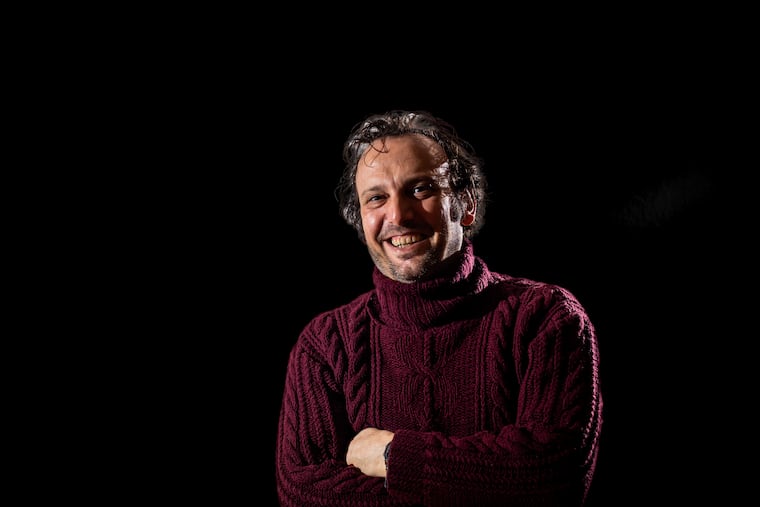In ‘Kiss,’ actors try a Syrian soap opera with cringey results — and that’s the point
Director Fadi Skeiker talks about the big responsibilities and messy challenges of telling someone else’s story.

In another life, Fadi Skeiker could have directed Syrian soap operas. As an undergrad in Damascus, he learned from TV directors and studied next to leading actors who have contributed to Syria’s thriving soap opera industry despite the ongoing civil war. He’s now using that degree to direct Kiss, an upcoming play at the Wilma Theater about the making of a Syrian soap.
By Chilean playwright Guillermo Calderón, Kiss follows a group of American actors who are performing a soap opera by a Syrian writer, with mixed and cringey results as they walk a tightrope between cultural appreciation and cultural appropriation. It opens Feb. 3, with previews starting Jan. 31.
Skeiker, who teaches directing, playwriting, and theater production at the University of the Arts, spoke to The Inquirer about his personal connections to the show, his history of using theater as therapy for refugees, and his favorite Syrian soap opera on Netflix.
What stuck out to you when you first read the Kiss script?
The play asks very fundamental questions about issues of representation and what kind of responsibility you have as a theater artist representing an identity that’s not yours. ... In [our] case … it’s hard to find Syrian refugees or artists in Philadelphia for that story, so we are going to use [the Wilma’s] HotHouse Company to do it. What responsibilities are put on HotHouse to do a just representation of the Syrian story? This is exactly what [Kiss] is about. An American theater company trying to stage a Syrian soap opera — are they getting it wrong? Right? What does that tell us about them? These questions relate to the responsibility of theater artists to be diligent and careful when working on a story that’s not theirs and that definitely stuck with me.
Before coming to the U.S. six years ago, you worked with Syrian refugees and immigrant communities in Germany, Portugal, and Jordan. How did your background in drama therapy inform your approach?
I used to do projects with Syrian refugees and work with immigrants to tell their story. I used applied theater as a tool to address their social issues and well-being [through] drama therapy.
There’s one Syrian character [in Kiss]. She’s speaking Arabic and in the script ... Skyping with the American actors, so we don’t see her on stage. The way I understand representation, it’s very important to have an embodied person speaking in Arabic. So I made the directorial decision: I’m going to put the actress on stage. And that came from my applied theater background.
Whenever I [work] with refugees, I do notice that they care a lot about their narrative; they want to be heard. ... They want a direct listener. So we did a national search for a qualified actress who could speak Arabic fluently and finally found Lois Abdelmalek. She’s Egyptian, so we worked with a dialect coach to make her Arabic more Syrian.
Will this be the first time that this character will be put on stage for a Kiss production?
I think so. From pictures [I’ve seen] most of the plays have [projected] a regular Skype interview. This is definitely also the first time a Syrian director is directing this play. Only a Syrian director would make a bold choice about representation like this and be very clear about why he wants the actress to be on stage.
It sounds like there’s an immense amount of pressure on you as a Syrian immigrant to tell this story. How have you dealt with those expectations?
Maybe because I’ve lived in the West for so long, I feel OK about it. What’s helped me is thinking about this as a project rather than a play. This is a project to get folks in Philadelphia to think and hopefully talk publicly about Syria, about refugees issues, and what’s our responsibility to help. Framing it that way makes it bigger than me ... that relieves some of the pressure.
There’s a strong soap opera culture in Syria. Do you have a favorite contemporary soap opera?
Syria is one of the leading countries in the Arab region in producing soap operas. Even now, during the war, they’re still produced. During Ramadan, most people are fasting and want to pass the time so they invite friends to watch soap operas.
There’s one called Al Hayba on Netflix that the actors are watching to immerse themselves. This is a very good Syrian example of a soap opera that’s [available to U.S. viewers] online.
“Kiss” runs Feb. 3-19 at the Wilma Theater, 265 S. Broad St., Phila., 215-546-7824, or wilmatheater.org.